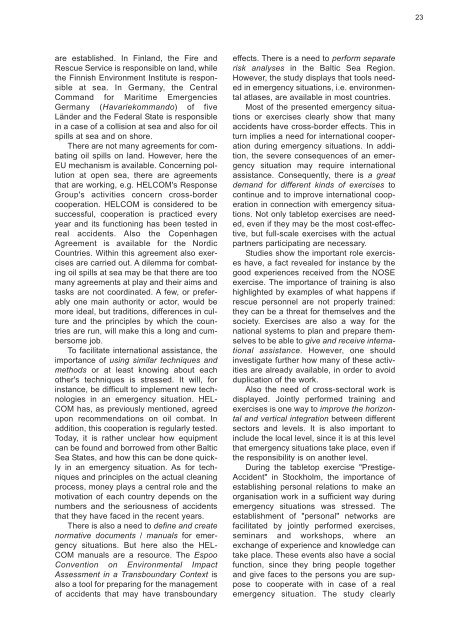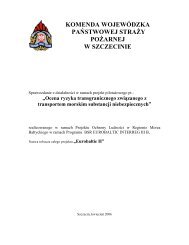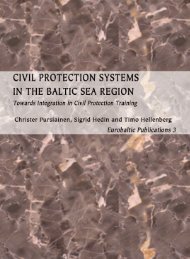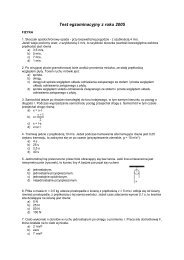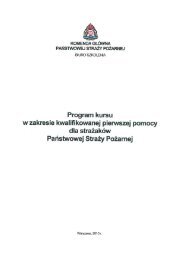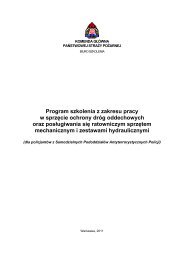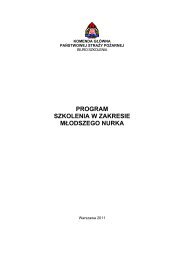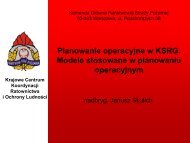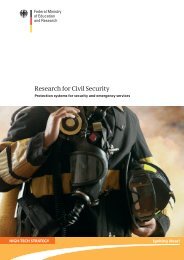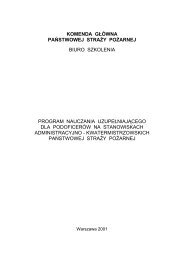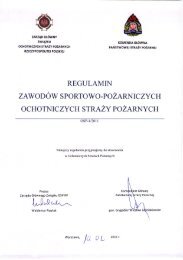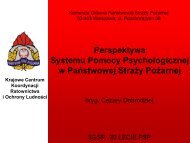Cross-Border Risks in the Baltic Sea Region: Lessons to ... - Helsinki.fi
Cross-Border Risks in the Baltic Sea Region: Lessons to ... - Helsinki.fi
Cross-Border Risks in the Baltic Sea Region: Lessons to ... - Helsinki.fi
You also want an ePaper? Increase the reach of your titles
YUMPU automatically turns print PDFs into web optimized ePapers that Google loves.
23<br />
are established. In F<strong>in</strong>land, <strong>the</strong> Fire and<br />
Rescue Service is responsible on land, while<br />
<strong>the</strong> F<strong>in</strong>nish Environment Institute is responsible<br />
at sea. In Germany, <strong>the</strong> Central<br />
Command for Maritime Emergencies<br />
Germany (Havariekommando) of <strong>fi</strong>ve<br />
Länder and <strong>the</strong> Federal State is responsible<br />
<strong>in</strong> a case of a collision at sea and also for oil<br />
spills at sea and on shore.<br />
There are not many agreements for combat<strong>in</strong>g<br />
oil spills on land. However, here <strong>the</strong><br />
EU mechanism is available. Concern<strong>in</strong>g pollution<br />
at open sea, <strong>the</strong>re are agreements<br />
that are work<strong>in</strong>g, e.g. HELCOM's Response<br />
Group's activities concern cross-border<br />
cooperation. HELCOM is considered <strong>to</strong> be<br />
successful, cooperation is practiced every<br />
year and its function<strong>in</strong>g has been tested <strong>in</strong><br />
real accidents. Also <strong>the</strong> Copenhagen<br />
Agreement is available for <strong>the</strong> Nordic<br />
Countries. With<strong>in</strong> this agreement also exercises<br />
are carried out. A dilemma for combat<strong>in</strong>g<br />
oil spills at sea may be that <strong>the</strong>re are <strong>to</strong>o<br />
many agreements at play and <strong>the</strong>ir aims and<br />
tasks are not coord<strong>in</strong>ated. A few, or preferably<br />
one ma<strong>in</strong> authority or ac<strong>to</strong>r, would be<br />
more ideal, but traditions, differences <strong>in</strong> culture<br />
and <strong>the</strong> pr<strong>in</strong>ciples by which <strong>the</strong> countries<br />
are run, will make this a long and cumbersome<br />
job.<br />
To facilitate <strong>in</strong>ternational assistance, <strong>the</strong><br />
importance of us<strong>in</strong>g similar techniques and<br />
methods or at least know<strong>in</strong>g about each<br />
o<strong>the</strong>r's techniques is stressed. It will, for<br />
<strong>in</strong>stance, be dif<strong>fi</strong>cult <strong>to</strong> implement new technologies<br />
<strong>in</strong> an emergency situation. HEL-<br />
COM has, as previously mentioned, agreed<br />
upon recommendations on oil combat. In<br />
addition, this cooperation is regularly tested.<br />
Today, it is ra<strong>the</strong>r unclear how equipment<br />
can be found and borrowed from o<strong>the</strong>r <strong>Baltic</strong><br />
<strong>Sea</strong> States, and how this can be done quickly<br />
<strong>in</strong> an emergency situation. As for techniques<br />
and pr<strong>in</strong>ciples on <strong>the</strong> actual clean<strong>in</strong>g<br />
process, money plays a central role and <strong>the</strong><br />
motivation of each country depends on <strong>the</strong><br />
numbers and <strong>the</strong> seriousness of accidents<br />
that <strong>the</strong>y have faced <strong>in</strong> <strong>the</strong> recent years.<br />
There is also a need <strong>to</strong> def<strong>in</strong>e and create<br />
normative documents / manuals for emergency<br />
situations. But here also <strong>the</strong> HEL-<br />
COM manuals are a resource. The Espoo<br />
Convention on Environmental Impact<br />
Assessment <strong>in</strong> a Transboundary Context is<br />
also a <strong>to</strong>ol for prepar<strong>in</strong>g for <strong>the</strong> management<br />
of accidents that may have transboundary<br />
effects. There is a need <strong>to</strong> perform separate<br />
risk analyses <strong>in</strong> <strong>the</strong> <strong>Baltic</strong> <strong>Sea</strong> <strong>Region</strong>.<br />
However, <strong>the</strong> study displays that <strong>to</strong>ols needed<br />
<strong>in</strong> emergency situations, i.e. environmental<br />
atlases, are available <strong>in</strong> most countries.<br />
Most of <strong>the</strong> presented emergency situations<br />
or exercises clearly show that many<br />
accidents have cross-border effects. This <strong>in</strong><br />
turn implies a need for <strong>in</strong>ternational cooperation<br />
dur<strong>in</strong>g emergency situations. In addition,<br />
<strong>the</strong> severe consequences of an emergency<br />
situation may require <strong>in</strong>ternational<br />
assistance. Consequently, <strong>the</strong>re is a great<br />
demand for different k<strong>in</strong>ds of exercises <strong>to</strong><br />
cont<strong>in</strong>ue and <strong>to</strong> improve <strong>in</strong>ternational cooperation<br />
<strong>in</strong> connection with emergency situations.<br />
Not only table<strong>to</strong>p exercises are needed,<br />
even if <strong>the</strong>y may be <strong>the</strong> most cost-effective,<br />
but full-scale exercises with <strong>the</strong> actual<br />
partners participat<strong>in</strong>g are necessary.<br />
Studies show <strong>the</strong> important role exercises<br />
have, a fact revealed for <strong>in</strong>stance by <strong>the</strong><br />
good experiences received from <strong>the</strong> NOSE<br />
exercise. The importance of tra<strong>in</strong><strong>in</strong>g is also<br />
highlighted by examples of what happens if<br />
rescue personnel are not properly tra<strong>in</strong>ed:<br />
<strong>the</strong>y can be a threat for <strong>the</strong>mselves and <strong>the</strong><br />
society. Exercises are also a way for <strong>the</strong><br />
national systems <strong>to</strong> plan and prepare <strong>the</strong>mselves<br />
<strong>to</strong> be able <strong>to</strong> give and receive <strong>in</strong>ternational<br />
assistance. However, one should<br />
<strong>in</strong>vestigate fur<strong>the</strong>r how many of <strong>the</strong>se activities<br />
are already available, <strong>in</strong> order <strong>to</strong> avoid<br />
duplication of <strong>the</strong> work.<br />
Also <strong>the</strong> need of cross-sec<strong>to</strong>ral work is<br />
displayed. Jo<strong>in</strong>tly performed tra<strong>in</strong><strong>in</strong>g and<br />
exercises is one way <strong>to</strong> improve <strong>the</strong> horizontal<br />
and vertical <strong>in</strong>tegration between different<br />
sec<strong>to</strong>rs and levels. It is also important <strong>to</strong><br />
<strong>in</strong>clude <strong>the</strong> local level, s<strong>in</strong>ce it is at this level<br />
that emergency situations take place, even if<br />
<strong>the</strong> responsibility is on ano<strong>the</strong>r level.<br />
Dur<strong>in</strong>g <strong>the</strong> table<strong>to</strong>p exercise "Prestige-<br />
Accident" <strong>in</strong> S<strong>to</strong>ckholm, <strong>the</strong> importance of<br />
establish<strong>in</strong>g personal relations <strong>to</strong> make an<br />
organisation work <strong>in</strong> a suf<strong>fi</strong>cient way dur<strong>in</strong>g<br />
emergency situations was stressed. The<br />
establishment of "personal" networks are<br />
facilitated by jo<strong>in</strong>tly performed exercises,<br />
sem<strong>in</strong>ars and workshops, where an<br />
exchange of experience and knowledge can<br />
take place. These events also have a social<br />
function, s<strong>in</strong>ce <strong>the</strong>y br<strong>in</strong>g people <strong>to</strong>ge<strong>the</strong>r<br />
and give faces <strong>to</strong> <strong>the</strong> persons you are suppose<br />
<strong>to</strong> cooperate with <strong>in</strong> case of a real<br />
emergency situation. The study clearly


